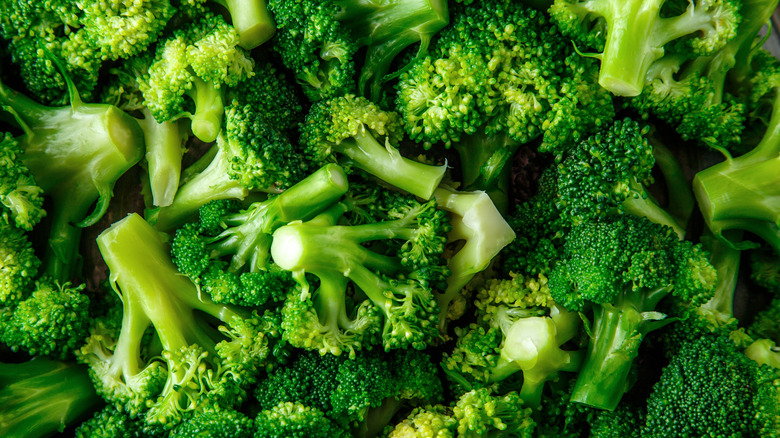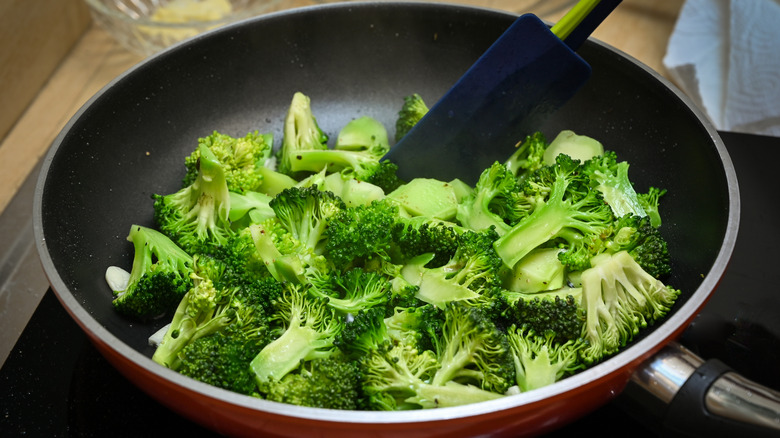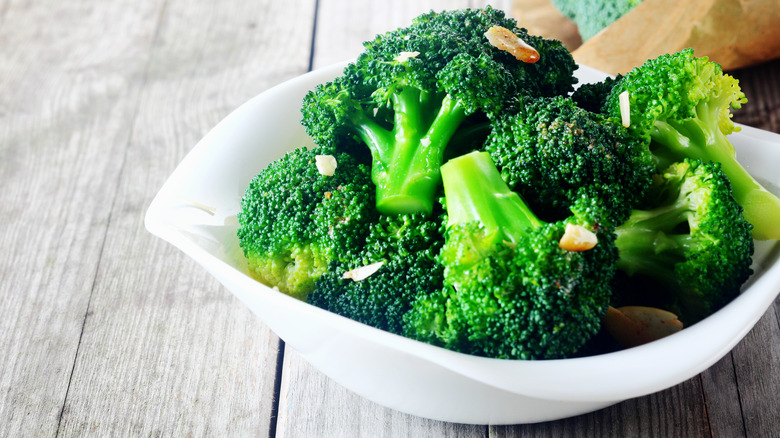Raw Versus Cooked Broccoli: Which One Is Better For You?
Many of us know that eating more vegetables boosts dietary nutrition and adds important micronutrients to our diets, but is what we eat all that matters? Science suggests it's not, particularly if we're trying to optimize nutrient absorption and bioavailability. Bioavailability is an important concept that refers to how much of a food's vitamins and minerals our bodies actually absorb after we've digested it.
Science suggests we have the ability to influence bioavailability based on certain factors (via Livestrong). One of the most important factors being if and how we cook them. Broccoli is a great example where preparation matters. With a steady 7% sales increase in 2019, it's clear broccoli isn't leaving our plates anytime soon (via Produce Market Guide). So, how do we get the most out of this health-boosting veggie, and which is better: raw or cooked broccoli? Let's take a look at what the science says.
The pros and cons of cooking broccoli
Broccoli is known for many important nutritional qualities, including anti-cancer properties, bone health benefits, immune system support, improved skin health, and cardiovascular protection, just to name a few (via Medical News Daily). Some people fear that by cooking broccoli, the health benefits are lost in the process. While some nutrient depletion can occur during the cooking process, it's important to know the extent. Several cooking factors are at play when it comes to how many nutrients may be lost, including cooking method and cooking time.
For example, boiling broccoli in a large amount of water causes the water-soluble vitamins in broccoli to leach, particularly vitamins B and C. If you discard the water, instead of perhaps eating it as a soup, you'll be discarding the vitamins as well. In fact, about 15-25% of broccoli's vitamin C will be lost in this case, and 5-15% of most B vitamins, as well as 15-35% folate (via Livestrong). When it comes to mineral retention, steaming, stir-frying, and roasting are best. In these cases, you'll be getting 100% of the mineral content. However, if you boil it, it loses about 5-10% mineral retention. When considering ways to cook your broccoli, opt for methods that cook the vegetable faster and with less water.
What about bioavailability?
Broccoli is rich in vitamin A, which is actually a form of carotenoid. Carrots apparently can't steal all the carotenoid glory! The carotenoids exist within the structural cell walls of the broccoli, also known as the cellular matrix. Cooking draws the vitamin A from the cellular matrix by breaking down those cell walls. While some of the vitamin A is lost during the cooking process, the increased bioavailability makes up for it, via Livestrong.
Additionally, because broccoli is a fiber-rich food (5 grams per 1 cup cooked broccoli), it's important to note that fiber isn't affected by the cooking process. For greatest bioavailability, research states that in order to extract and retain the greatest levels of nutrients, you'll want to blanch, lightly steam, or microwave broccoli for less than a minute (via the American Institute of Cancer Research). By utilizing these techniques of lightly cooking broccoli, 1 cup will yield over 100% daily values of vitamin K, 80% of vitamin A, 42% of folate, 23% of vitamin B6, and an excellent amount of iron and potassium, via Livestrong.



